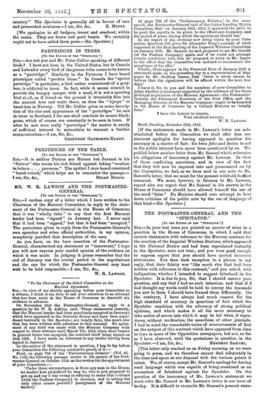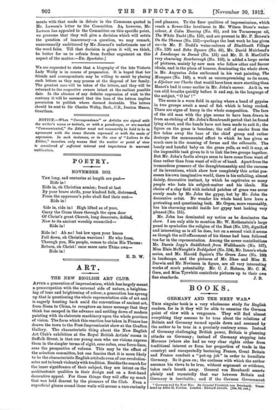THE POSTMASTER-GENERAL AND THE "SPECTATOR."
[TO THE EDITOR OF TEN " SPECTATOR:9
SIR,—In your last issue you printed an answer of mine to a question in the House of Commons, in which I said that certain statements with reference to the Marconi contract for the erection of the Imperial Wireless Stations, which appeared in the National Review and had been reproduced textually in the Spectator, were not true ; and you were good enough to express regret that you should have quoted incorrect statements. You then took exception to a phrase in my reply, that their falsity was "like much else that had been written with reference to this contract," and you asked, with indignation, whether I intended to suggest falsehood in the Spectator. It is due to you, Sir, that I should answer your question, and say that I bad no such intention, and that if -I had thought my words could be held to convey the innuendo you saw in them I should have framed them differently. On the contrary, I have always had much respect for the high standard of accuracy in questions of fact which the Spectator combines with the advocacy of strong political opinions, and which makes it all the more necessary to take notice of errors into which it may be led when it repro- duces, without verification, the assertions of other journals. I had in mind the remarkable series of misstatements of fact on the subject of this contract which have appeared from time to time in some of the Opposition newspapers, but not, so far as I have observed, until the quotations in question, in the
[This letter only reached us on Friday morning as we were going to press, and we therefore cannot deal adequately in the time and space at our disposal with the various points it raises. We, of course, accept Mr. Samuel's apology for having used language which was capable of being construed as an accusation of falsehood against the Spectator. On the question of the inaccuracy of Mr. Lawson's statement we must refer Mr. Samuel to Mr. Lawson's letter in our issue of to-day. It is difficult to reconcile Mr. Samuel's present state-
ments with that made in debate in the Commons quoted in Mr. Lawson's letter to the Committee. As, however, Mr. Lawson has appealed to the Committee on this specific point, we presume that they will give a decision which will settle the question of inaccuracy—a question, we may remark, unnecessarily embittered by Mr. Samuel's unfortunate use of the word false. Till that decision is given it will, we think, be better for us to refrain from further argument on this aspect of the matter.—En. Spectator.]



















































 Previous page
Previous page